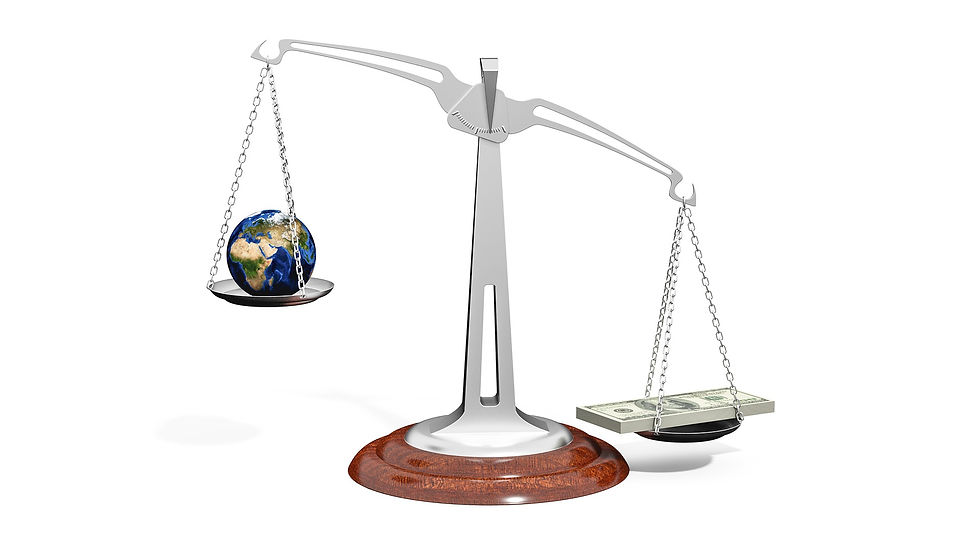Making our Way to a Carbon Free Society
- lkb2011
- Mar 7, 2020
- 3 min read
Updated: Apr 14, 2025
Henry MacLean
Latest climate data statistics from the Intergovernmental Panel on Climate Change (IPCC) show a one-in-a-million chance that atmospheric heating is not taking place due to human activity. While science never really gets rid of uncertainty, in cases like this, it reaches such low levels that it removes any rational debate on the issue. A new Pew Research Center Poll out this month reports that climate change is now the second most important election issue next to health care. Over 70% of Americans believe the government should do more about climate change, while 59% say they support a Green New Deal. One central aspect of the deal calls for 100% of the US power demand to be met through clean, renewable, and zero-emission energy sources by 2035. The IPCC agrees that if we don’t act we will lose the chance to slowdown the worst effects of global warming. The good news is that global renewable energy is rapidly expanding, doubling since 2008 to now 18% of all energy consumed globally. Last April, renewable energy provided 23% of US power generation, out preforming coal at 20%. While the task of dropping our personal carbon footprints to zero in the next few decades seems daunting to most, the best place to start is measuring where we are now. As management consultant Peter Drucker made clear, “ If you can’t measure it, you can’t manage it.” Thankfully, we have convenient tools available online that quickly and accurately allow us to measure our Co2 emissions. The Low Carbon Diet calculator from the Empowerment Institute (used by several Milton families back in 2007) is still available online. Newer programs like the Cool Climate Network calculator incorporate not only all of our home & transport fuel, air travel, and garbage, but also add in what you eat, how much water you use, and other buying habits. We know that roughly 55% of total energy used in Milton is for residential use,30% transportation, 12% commercial, and 2 % for town/ government use. It follows that homeowners in Milton are able to make direct decisions on 85% of our energy use by what we drive and how we power our homes. These decisions can include taking advantage of rebate and incentive programs to retrofit one’s home, readily cutting 50% of energy use.Programs like Mass Save, the Mass Save Residential Renovations and Additions program, the DOER Home Energy market Value Performance (Home MVP) Program,Renewable Energy Portfolio Standard and Mass Clean Energy Center (CEC) can provide incentives and rebates up to $20,000 per retrofit project. With the drop in cost and increase ineffectiveness of solar photovoltaic (PV) systems, up to 50% of homes in Milton can now produce electricity with return on investment packages of 7 years and less. Given electric vehicles (EV’s) save over half of annual maintenance and gas fees on top of attractive rebates and tax incentives, they are now competing with new car sales in the US averaging $36,600 in 2019. Renewable electricity is still available for those homes not eligible for solar due to shading or poor orientation. With electricity deregulation, 100% renewable sources can be found to compete with the 10.8 cent charge from Eversource through Energy Switch Massachusetts. Every megawatt-hour (1000 kWh)of clean renewable energy produced is allocated one renewable energy credit(REC), which are monitored and traded through the New England Generation Information System (NE-GIS). Homeowners with solar also purchase REC’s to achieve zero-emission status as added power is needed for that EV or high efficiency heat pump, increasingly heating and cooling our homes.Meanwhile, the Town is awaiting final approval from the Dept. of Public Utilities (Mass DPU) for its Community Electrical Aggregation program, expected to be launched this spring with a comprehensive information and marketing campaign we are all looking forward to. As we move forward in selecting a new national administration, we should remind ourselves of the overwhelming statistics and science the IPCC is sharing. How fast we transition to a carbon free society will depend not only on understanding our own carbon footprints,but also assuring that we get a national policy to implement the important details of a New Green Deal. Sustainable Milton (SM) raises awareness, educates and motivates residents, town government and businesses to reduce waste of all forms, to help create a healthy, vibrant future for all. Click “JOIN” at www.sustainablemilton.org.




Comments